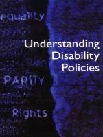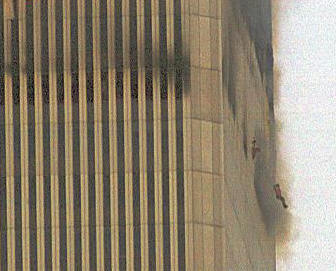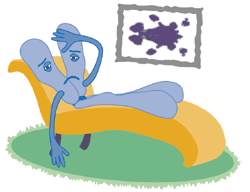| Article Overview:
What happens when a person seeks to claim disability from the Beast of
Terror's wrath? Do the insurance companies smile or frown?
How do you fare when you open your insurance policy and seek to get a
claim satisfied? Do you get more or less than you deserve?
Here's one example of a man seeking financial justice for
battling the Beast of Terror. The question is, will he win
or lose the battle? Find out. |
 VigilanceVoice VigilanceVoice

Monday, February 9,
2004—Ground Zero Plus 880
___________________________________________________________
The Terror Of Fighting For Disability Insurance
___________________________________________________________
by
Cliff McKenzie
Editor, VigilanceVoice.com
|
GROUND ZER0, New York, N.Y.--Feb 9, 2004 -- Have you ever tried
to read and understand an insurance policy? If Terrorism
exists in various forms, one of them is the confusion that creates
Fear, Intimidation and Complacency.

|
|
My friend is
Terrorized by his disability policies |
I
have a close friend who is embroiled in the battle to understand his
rights regarding a disability policy he purchased nearly two decades
ago. He recently wrote one of the nation's major
insurance company (whom I will not name) a long letter describing his
confusion over the wording of his policy.
He has two of them, an original
that offered benefits of $1,000 a month if he was incapable of
performing his regular occupation, and a subsequent one that boosted
those benefits another $1,900 a month.
The original policy speaks
about "concurrent" and "recurrent" benefit periods, with no reference
to a break between one ailment and the onset of another.
In the second policy, issued at a later time, there is a specific
absence of words "concurrent" and "recurrent," and, a demand that the
policy holder be working for six months before a new claim can be
made.
Confused already?
Imagine trying to read anything
written by attorneys and understanding your rights, whatever it might
be. It gets down to "Legalize Terrorism."
Talk about Fear, Intimidation
and Complacency! Try being a Philadelphia lawyer and
figuring out what your rights are under any contract, and then facing
off with a fifty-story building full of attorneys whose primary
mission is to close loopholes.
My friend is suffering
from Post Traumatic Stress Disorder that beset him after the Terrorist
attack on the World Trade Center and didn't manifest itself, at least
to him, until recently when he realized his life had been unraveled.

|
|
Prior to Nine
Eleven my friend suffered from depression |
Prior to Nine Eleven he was suffering from depression, and had filed
for disability through his insurance policy for that problem.
He's not a slouch. He had once been a powerful business
leader, earning in one year $300,000. Not bad.
Then he suffered a series
of setbacks, including being infected by colon cancer, and then, his
wife contracted breast cancer.
He lost his home, filed
for bankruptcy and was field audited by the Internal Revenue Service.
He clung to his
disability policy, for his insurance agent had told him the odds of
him using were tenfold over life insurance.
He took those words to
heart, and the disability policy helped him from ending up on the
streets begging for alms on two occasions: once after having
cancer, and then when he suffered a debilitating depression after
moving to New York City with his wife's breast cancer attack.
 |
|
My friend
witnessed people leaping out of the World Trade Center buildings
on Nine Eleven |
My friend was
well into a year of benefits under his depression diagnosis when he
witnessed the World Trade Center attack at Ground Zero. He
saw the people leaping from the buildings, and the death and
destruction of the worst attack on America since the War of 1812 by
foreign invaders.
He became obsessed with
fighting Terrorism on that day, and set about anti-Terrorism campaigns
to alert the public of the dangers of Terrorism and how to thwart it.
He worked hard each day to get people to listen to his pleas for them
to prepare and defend themselves from the "Beast of Terror," and
became an advocate for the "Sentinels of Vigilance,"--all those who
died that fateful day of September 11, 2001.
But his life was whirling
down the toilet--at least his financial life.
When his benefits,
maximized over two years--ran out in October 2002, he was forced to
cancel his health insurance which was costing him more than $1,200 a
month to cover himself and his wife.
During that time, he
continued his battle against Terrorism. Each and every day
he went to the public with his message of Vigilance, undaunted by the
fact that his financial well was dry. He begged and borrowed
funds to keep his head above water, and vaingloriously sought
contributions and donations for his cause, none of which appeared.
"I believe in what I am
doing--that it is the right thing to do. And I can't stop
doing it. I can't. I wake up in a cold sweat each
morning seeing the face of the Beast of Terror leaning over my
grandchildren's bed, staring into their faces, hissing at them.
I'm not going to stand by and let the Beast threaten them, or any
child," he says. "I'm not going to stop ringing the Vigilance
Bell."
 |
|
My friend
attended all the memorials and events involving the victims of
Nine Eleven |
My friend went to
all the memorials and events that involved the victims of Nine Eleven.
He marched in the parades, went down into the pit when President Bush
came to New York to pay homage to the victims of the attack.
He wore a black band on his arm for months. He sent
letters and emails to countless people, promoting the need to fight
Terrorism with Vigilance with nothing but a blank response, no
encouragement. It was as though the world had
stonewalled him.
The nightly sweats
and faces of those who died that day didn't evaporate. He saw
them constantly. Sometimes his anger and rage bubbled to
the surface and he had to constrain himself from lashing out against
those he believed were trying to commercialize the tragedy, or using
it as political football, or attempted to marginalize its impact on
the national security of America.
He also felt ashamed and
guilty that he hadn't done more that day, that he hadn't been wounded
or killed in the attack. Even though his life had
been put at stake by his presence, he didn't give that the credit he
gave to those who had suffered and died. To him, all
the "victims" were the real heroes of the day, not just the fireman or
police who perished.
Unfortunate for him, he
didn't attend the post Nine Eleven therapy sessions being offered to
the victims and survivors of that day. Instead, he
believed that what he was doing--his daily actions to heal the wounds
of Terrorism--were his therapy.
He was also attending
meetings with his psychiatrist under the "depression" diagnosis.
He didn't talk much about the events of Nine Eleven, except to explain
what he was doing to fight Terrorism. The psychiatrist was
focused on his depression, not on the additional trauma of Nine
Eleven.
When his health insurance
expired, so did his ability to get treatment. He fell into
never-never land.
That didn't stop his battle
with Terrorism. He fought the Beast of Terror each day, despite
the slow sinking of his financial ship. Finally, he
sat in a crumpled mass, wondering why he couldn't seem to do anything
but fight Terrorism with his daily words and efforts to alert the
public of its dangers. Why couldn't he flip
hamburgers to pay the rent, or give up the obsession to slay the Beast
of Terror? Why did his thoughts continue to rush back to the
burning buildings, the collapse of the Trade Center, the choking of
the dust, the screams of the people? Why did he see
the Beast whenever he blinked his eyes, and then felt compelled to
find ways to battle it, to reduce it to a non-threat, an impotent
virus rather than a lethal one?
 |
|
He began
seeing a psychologist at the urging of his daughter |
He went to see a psychologist
at the urging of his daughter. The psychologist agreed to
meet with him pro bono. After a few sessions, the
psychologist told him he was suffering from Post Traumatic Stress
Disorder. My friend's obsession with battling Terrorism
was a symptom of his shame and guilt over being powerless to stop the
tragedy. He had inculcated into his soul the deaths
of thousands, and was trying to repair them single-handedly.
The rage and anger he held for those who were either Complacent or
commercially using Nine Eleven, added to his symptoms.
His nightmares and reliving of the event over and over buried him in
the blood of that day, gluing to him a shroud of desperate desires to
right a horrible wrong he had witnessed.
At the urging of the psychologist to
get his financial life from sinking to the bottom, he cracked open his
disability policies. He had been told that he could not
file again until six months had lapsed between one benefit period and
another. He had to "be working" for six months before a
new benefit period would be considered, and, during that time, he
would have to pay the premiums.
In other words, he would have to get "well"
before he got "sick" before the policy would cover him.
But as he studied his original policy, he
found that the original policy didn't have such a clause.
The second policy did.
He was confused. It seemed
clear from the first policy that if a "concurrent" disabling event
happened while covered for a previous one, the new disability would
kick in following the benefit period of the previous.
The catch, of course, was that the two must
be different.
The issue he faced, at least in his mind:
"Was the diagnosis of Post Traumatic Stress Disorder different from
depression?"
 |
|
There seemed
to be a distinct separation between PTSD and depression |
There seemed
to be a distinct separation of the two. In one case
he was unable to do anything. He felt "depressed."
In the second case, he was full of rage and anger, controlled,
however, and expressed his emotions in his daily desire to "right the
wrong of Nine Eleven." He tackled the challenge with
the passion of a hungry dog, furiously working each day to get the
world to notice his suggestions on how to Battle the Beast.
He studied and researched and exposed his thoughts and beliefs
rigorously, as though he were being paid tens of thousands of dollars
for them.
He began to believe without question
he was suffering from PTSD, and wrote the major insurance company a
letter seeking their "advocacy." He wanted them to rule on
his contracts, his policies, to know if PTSD would be covered as a
"concurrent" or "recurrent" benefit period under the original or both
agreements.
I asked him why he was filing now,
2004, for an event that occurred in September, 2001. "I
didn't know I could," he said. "If pick up the second
policy and read its fine print, it says you have to be working for six
months to file a new claim. There's no reference to 'concurrent'
or 'recurrent' in it. It seems they torqued down the
second policy rights. But when I reread the original
policy closely, the words 'concurrent' and 'recurrent' leapt out at
me. When you're drowning, you grasp at twigs.
Only the words 'concurrent' and 'recurrent' seemed clear and obvious
as a rope not a twig. If I was suffering from PTSD as a
result of the World Trade Center attack, then I deserve the benefits.
I paid for them."
He handed me the contracts (policies)
to read. It seemed obvious he was right about the original
policy. It had no provisions for "healing" before "getting
sick" before the benefit period of a new disabling event applied.
But then, I'm not a lawyer paid to limit the cash exiting insurance
accounts.
"So, what are you doing now," I asked.
"I'm waiting," my friend said.
"What do you expect to happen?"
 |
|
"Does the
Beast of Terror have you in his grips?" |
His eyes
flared. "The worst, of course. I'm expecting them to
tell me I don't qualify, or that there's some loophole that disavows
the claim, or my right to it."
"You mean the Beast of Terror has you in
his grips?"
"Of course he does. I'm a gnat
on an elephant's ass. The Beast knows I'm going down for
the third, fourth, fifth time. Why not make it hard for me
to keep afloat. Why hit a man when he's down, kick him
it's easier."
"You sound like a victim?" I said,
smiling, trying to lighten the air.
"It's reality. But even
if they come back and say 'no,' I'm not through fighting.
I don't care what their point is if they deny the right to claim PTSD,
it's a legitimate claim. I'll do what I have to appeal."
 |
|
A person
wrestling with the Beast of Terror has a kind of frenetic
electricity about him |
My
friends eyes rolled. Persons wrestling with the
Beast of Terror has an air about them, a kind of frenetic electricity
that sparks wildly, as though they were standing with one foot on a
trip mine, wondering how they can leap from it before it explodes and
rips off their leg. Or, a wolf caught in a trap, gnawing on his
leg to escape the inevitable capture.
I thought of the battle of my
friend and all his scars. I thought about Post Traumatic
Stress Disorder, and how far distant that was from depression.
Here was my friend locked in a deadly battle with the Beast of Terror,
almost fruitlessly flailing his arms in its grip, trying to avoid
being swallowed by a creature far too large, far too powerful for even
Hulk Hogan to take on. Yet my friend was vowing to cripple the
Beast, to revenge and avenge his destruction of the innocent as though
he were some White Knight leading legions into battle, when in truth,
he was a ragged, threadbare man with ancient bones and weak arms
trying to flag a passerby to listen to his warning that they sky was
falling. There were no legions behind him, only garbage
cans with his name on them, waiting for him to scour through them for
cans and bottles to sell.
I wondered what a "disability" really
was. Was the battle against the Beast of Terror a
disability? To the rest of the world, it certainly
must be, for no one seems to listen to his cries in the night, or, at
least doesn't recognize them as having any veracity or worthiness.
I wondered what the insurance company was
thinking about what he had sent them. Were they going to
shun him, to avoid his cry for help and subject him to the world of
legal battle where his small Voice whimpered among the roars of great
legal lions? Was his interpretation of a contract just his
desire to see what he wanted to see, or was it a prima facia fact,
irrefutable to a judge and jury if it went that far?
I didn't want to be in his shoes.
Feb. 8--Food Terror:
Kids, Don't Eat The Chicken Nuggets or Burgers

|
|
|